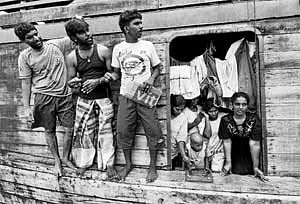Australia suggests hub in East Timor for migrants

In her first policy speech as prime minister, Julia announced plans to create a regional hub for processing refugees on the island nation of East Timor as a means of deterring thousands of mainly Sri Lankan and Afghan asylum seekers from paying criminal syndicates for passage to Australia in the hope of gaining residency.
“A regional processing centre removes the incentive once and for all for the people smugglers to send boats to Australia,” Julia told the Lowy Institute for International Policy in Sydney. “Why risk a dangerous journey if you will simply be returned to the regional processing centre?”
Julia said her plan would present a regional solution to the ‘global challenge’ of asylum seekers. The prime minister gave few details but said she had discussed her proposal with regional leaders, including President Jose Ramos-Horta of East Timor and Prime Minister John Key of New Zealand, and with the office of the United Nations High Commissioner for Refugees.
East Timor’s deputy prime minister, Jose Luis Guterres, said on an Australian radio broadcast that his government was considering the request and would make a decision in the coming weeks. But he expressed some concern that the impoverished country already had ‘many issues’ to resolve without the extra burden of a regional refugee camp.
The UN refugee agency issued a statement saying that it welcomed “constructive dialogue with Australia on cooperative approaches to refugee... protection that are in line with international protection standards” but added that it was too early to comment on the specific proposal.
The handling of boat arrivals from Asia has long been a contentious issue that many in Australia argue is out of proportion to the real threat.
Australia receives just 0.6 per cent of the world’s refugees, and boat arrivals account for just 1.5 per cent of the country’s 1,90,000 new immigrants each year, according to the United Nations and Australian government statistics.
Over the past three years, Australia has received about 140 boats carrying an estimated 6,000 asylum seekers, figures that pale in comparison with the tens of thousands of refugees and illegal immigrants that converge on Europe and the United States every year.
But the arrivals continue to unsettle many Australians, a phenomenon that countless books and academic papers have attributed to Australia’s anxiety at being a sparsely populated, mostly ethnically European country on the edge of Asia.
The toughest asylum programme
The refugee question has been a deciding factor in at least one election over the past decade, and with boat arrivals at a five-year high, it is back on the political radar. For most of the past decade, Australia has maintained one of the toughest asylum programmes in the developed world, placing all ‘irregular marine arrivals’ in isolated detention centres, surrounded by electrified, razor-wire fences, while their claims are assessed.
The conservative opposition Liberal Party has argued repeatedly that the government has made Australia more attractive to such arrivals by unwinding many of the policies enacted by the former prime minister, John Howard. Those policies include denying asylum seekers permanent residency and the right to be reunited with family members and charging refugees for the cost of their detention.
“The only way to stop the boats is to change the situation here in Australia,” the opposition leader, Tony Abbott, said at a news conference at which he presented his party’s refugee policy, promising to do “whatever it takes to keep our borders secure and our country safe.”
Many analysts in Australia interpret Julia’s ‘East Timor Solution’ as an attempt to appease both the right-and left-wing factions of the Labour Party she leads, neither of which she can afford to alienate before elections later this year.
“She doesn’t have much wiggle room,” said William Maley, the director of the Asia Pacific College of Diplomacy at the Australian National University. “The risk she faces is that if she goes too far to accommodate the views of those who are bitterly opposed to asylum seekers, she will alienate those members of her party who are deeply committed to the principle of Australia's international obligations.”
Julia has attempted to calm the often rancorous debate over Australia’s refugee policy, calling for a frank, open and honest national conversation about the issue.
“For too long, the asylum-seeker policy debate has been polarised by extreme, emotionally charged claims and counterclaims; by a fundamental disrespect that I reject,” she said. “If you are hard-headed you’re dismissed as hard-hearted. If you are open-hearted you are marginalised as supporting open borders. I say to those engaged in this type of rhetoric: Stop selling our national character short. We are better than this.”